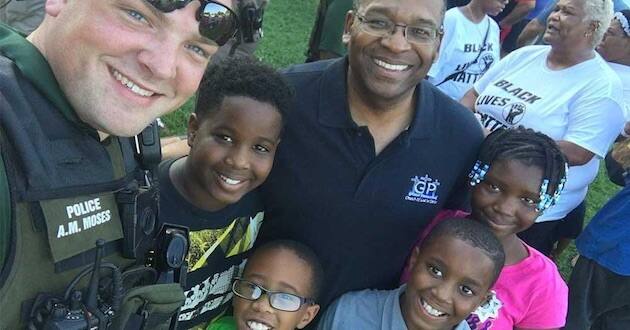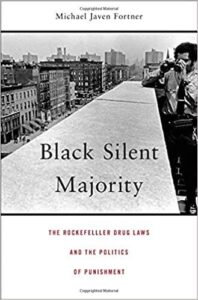Hearing what black voices really say about police

African-Americans have mixed attitudes about the police, but an extensive poll finds most are satisfied with their local departments and don’t want defunding.
Philonise Floyd testified recently to the House Judiciary Committee about the death of his brother George Floyd at the hands of Minneapolis police. “People of all backgrounds, genders and race have come together to demand change,” Floyd said. Pleading for comprehensive policing reform, Floyd asked Congress to “teach them what it means to treat people with empathy and respect. Teach them what necessary force is. Teach them that deadly force should be used rarely and only when life is at risk.” Unfortunately, Philonise Floyd’s earnest call for reform has been drowned out by an elite-driven narrative about race relations that is empirically weak, counterproductive, and not reflective of most black Americans’ attitudes and wishes.

According to a popular theory of institutionalized white supremacy, history functions not simply as context but as cause. White Americans, in this view, are born in sin — because of the nation’s original sin, slavery — and, for the most part, irredeemable. At birth, all African-Americans are caught in a historical vise that crushes freedom, joy, and (all too often) life itself. Progress is only a prelude to punishment. African-Americans exist without agency or effectiveness — except when achieving objectives or employing means endorsed by adherents of this view. The Black Panthers represented true emancipatory politics, the theory holds, while black anti-crime activism is either a fiction invented by reactionary social scientists or an indication of the reproductive force of white supremacy.
This theory cannot be falsified or verified; as with any dogmatic belief system, to challenge it is to affirm it. Simply to object to the premises of contemporary antiracism becomes a threat tantamount to violence, born of ignorance or ill will. Heterogeneity within and across nonwhite communities is immaterial, a diversion raised by defenders of the status quo. Capitalism, patriarchy, and homophobia are significant in as much as they constitute distinct levers of racialized social control. Analysis of racism has been transformed from a set of observations and falsifiable propositions into its own epistemology: a way of knowing that bends reality to its will and distorts everything it encounters.
Opinion and analysis over the last month have been suffused with these reductionist sensibilities. Sean Collins at Vox writes: “At the core of this rage is a legitimate fear for black Americans: the sense that they can be killed anywhere at any time by anyone, but especially by law enforcement. It is a feeling black Americans have carried for all of America’s history.” He provides examples of racial disparities in policing and punishment, but without context. For example, Collins cites a study that labels police-involved shootings a leading cause of death for African-American males. While it is true that black men between the ages of 25 and 29 are killed by police at a rate between 2.8 and 4.1 per 100,000, that’s well below the rate of their death in accidents (76.6 deaths per 100,000), by suicide (26.7 deaths per 100,000), from other homicides (22 per 100,000), from heart disease (seven per 100,000), and from cancer (a little over six per 100,000).
Moreover, black women in the same age bracket are killed by police at roughly 5 percent the rate of black men; surely if police killings were driven solely by racial animus, then black women would be victimized at a much higher rate. Despite the racial disparity in rates, a study of police-involved homicides between 2009 and 2012 shows that whites constituted a majority (52 percent) of victims. What explains “state violence” against whites? All in all, the evidence paints a murky picture, though still a troubling one. Too many people — including whites — die at the hands of law enforcement, but black men and women are much more likely to be killed by civilians and certain diseases than by the police.
Polling data suggest that most African-Americans do not share Collins’s bleak view of their experiences. In a 2019 Pew survey, 44 percent of blacks reported being “unfairly stopped by police” because of their race; 54 percent said, “No, has not happened to me.” In a Monmouth poll taken after Floyd’s death, 44 percent of African-Americans reported that they or an immediate family member felt “harassed by police,” but a majority did not share this experience. When asked, “How satisfied are you with the job your local police department does,” 21 percent said “very satisfied,” 51 percent said somewhat satisfied, 12 percent said somewhat dissatisfied, and only 5 percent said that they were “very” dissatisfied. These results do not suggest a complete endorsement of contemporary policing, as many blacks report negative interactions. Yet nearly three-quarters of surveyed African-Americans report themselves satisfied with their local police departments.
Lest we take African-Americans at their word, though, Vox ran an “explainer” to tell us “how black people really feel about the police.” Summarizing a handful of polls, Aaron Ross Coleman writes:
A 2015 Gallup poll found that black adults who believed police treated black people unfairly were also more likely to desire a larger police presence in their local area than those who thought police treated black people fairly. A 2019 Vox poll found that despite being the racial group with the most unfavorable view of the police, most black people still supported hiring more police officers. And more recently, a June 2020 Yahoo News/YouGov survey taken after the killing of George Floyd found that 50 percent of black respondents still said that “we need more cops on the street,” even as 49 percent of black respondents said when they personally see a police officer it makes them feel “less secure.”
Though he concedes that it’s “possible to interpret black people’s views of police as generally favorable,” Coleman chooses to ignore the data and follow his intuition about black opinions instead. A racist political system, he explains, “acted on black support for ‘tough on crime’ policies but not on the social welfare policies, though if they had their druthers, polling suggests black people would choose the latter.” If this were true, why would policy constraints compel African-Americans to express even mild support for something that gives them the “sense that they can be killed anywhere at any time”? If the black experience with police is as Collins and Coleman suggest, then 58 percent of African-American respondents in a 2019 Vox survey should not have held a “favorable” view of local police.
Polling from New York City in the immediate aftermath of Eric Garner’s death in 2014 is telling. In response to an open-ended question asking them to name the “most important problem facing New York,” only 6 percent of all respondents in a Quinnipiac University survey of New York City voters listed police, and only 1 percent mentioned racism or race relations—far behind the economy, housing, crime, and education as issues of topmost concern. When asked if “being the victim of police brutality is something you personally worry about,” 53 percent of African-Americans said “no” and 46 percent said “yes.” Still, a clear majority of African-Americans (56 percent) described “police brutality” as a “very serious” problem. Another 34 percent called it “somewhat serious.” Among blacks, the approval rate for the New York City Police Department was low: only 35 percent approved while 59 percent disapproved. Yet, when asked about “the way the police in your community are doing their job,” 56 percent of African-Americans approved, and 41 percent disapproved.
Though nearly all blacks called the police actions that took Garner’s life inexcusable, they were split on the details of the encounter. The poll asked, “If someone were selling loose cigarettes in a neighborhood, would you want police to ignore that behavior or try to make that person stop, even if it means arresting that person?” Forty-six percent of black respondents said, “Try to stop,” and 46 percent said “ignore.” Another question asked, “If a person tells police they are not going to allow police to arrest them, should police walk away or use whatever amount of force is necessary to arrest the person”? Only 20 percent of black respondents said that police should “walk away.” Fifty-four percent said, “use necessary force.”
None of this is new. In a 1970 Vera Institute survey of residents of the predominantly black neighborhood of Bedford-Stuyvesant, we hear familiar complaints about police: “They are rougher on black people”; “Police perform brutal acts that are not necessary on poor people”; “The police are terrible on [blacks] and Puerto Ricans”; “Whites are treated better.” We hear familiar frustrations: “When there is a fight or something, they don’t really seem to come”; “My sister saw some people with dope and she told the policeman and he told her to call the precinct”; “a lady got robbed one night . . . [and] she called the police but they never showed up.”
These grievances notwithstanding, these respondents wanted more police presence, not less, in their community. When asked to choose between having a policeman patrol the neighborhood in a car every 15 minutes or on foot every two hours, 69 percent of residents selected the car every 15 minutes. When given a list of items and asked if police should spend more on them, 73 percent said arresting “narcotics pushers,” 59 percent said trying to recover stolen property, 58 percent said arresting “narcotics users.” When asked what police should spend less time on, 43 percent said writing up parking tickets; 30 percent tracking down sellers of pornographic materials; 29 percent assisting in family disputes; and another 29 percent preventing illegal gambling.
Still, it’s plausible that these responses, as Coleman suggested decades later in response to similar poll results, obscured broader policy priorities. Another question asked: “Here is a list of city services. If New York City had extra money to spend, on which three of these services would you like to see money spent?” The top answers included: cleaner streets (49 percent), more police (34 percent), improved hospital and medical care (29 percent), better job training (28 percent), and more low and middle-income

housing (26 percent). The survey asked: “Now suppose the city had to cut back on the money it could spend because of rising costs. Which three of these services do you think should be cut first?” The top responses included: reducing air pollution (35 percent), better park maintenance (28 percent), higher welfare payments (28 percent), and keeping the 20-cent fare on subways and buses (25 percent). Thus, if Bedford-Stuyvesant residents had their “druthers” in 1970, they would have picked cleaner streets, better health care, affordable housing, more job training, and more policing — with more policing as the second-highest choice. “Dismantling” the police was not a priority for black people in 1970. It still isn’t.
Neither the actual incidence of police-involved killings, nor black public opinion, justifies discriminatory law-enforcement strategies or brutality. Nevertheless, they undermine the dominant narrative and the totalizing racial theory that undergirds it. Though aware of, concerned about, and opposed to “state violence,” African-Americans are far more worried about bread-and-butter issues, like jobs, housing, education, and health care. And public safety is also a bread-and-butter issue. Black people consider violence and some street crimes threats to their pursuit of the good life, as they define it. At times, they have even endorsed draconian measures and aggressive strategies to meet that threat. Instead of relating these comprehensible complexities, “explainers” at Vox and opinion pieces in major newspapers have doubled down on a deeply flawed pop sociology that demands the erasure or marginalization of these black perspectives.
We are witnessing the embourgeoisement of racial politics. A reading public not long ago captivated by Hillbilly Elegy is now obsessed with White Fragility. Each day, college-educated millennials race to social media to practice the rituals of wokeness by condemning various cultural artifacts as racist and policing the discourse. Statues are coming down, and the “b” in black is being capitalized. Corporations, private schools, and major philanthropic organizations are declaring that “black lives matter.”
Elite institutions have committed themselves to a theory, program, and performance increasingly detached from the aspirations, worldviews, and everyday concerns of millions of blacks. Activists have secured pledges to “defund” or “dismantle” police departments, but black Americans haven’t received concrete, alternative public-safety plans to curb violence. Most African-Americans clearly desire police reform over abolition. They echo Philonise Floyd’s mournful call. Their perspectives deserve consideration. Any “antiracist” movement that disregards how working and middle-class African-Americans define and pursue the good life is not worth its name.








